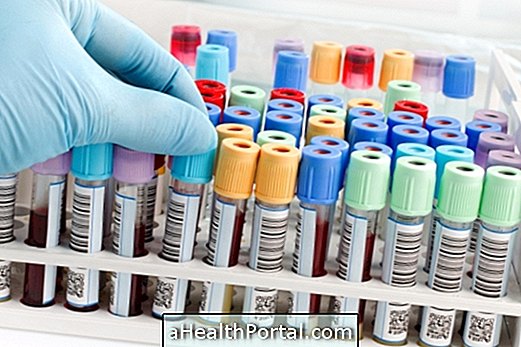The albumin test is done to check the patient's general nutritional status and to identify possible renal or hepatic problems.
Albumin is the protein present in the highest concentration in the blood. It is produced by the liver, whose main functions are to transport hormones, vitamins, nutrients and medicines, regulate the pH and maintain the osmotic balance of the organism, thus regulating the amount of water in the blood . Thus, the synthesis of albumin by the liver is regulated by the nutritional status of the person, amount of hormones produced and circulating in the body and blood pH.
The albumin test is requested when there is a suspicion of renal and hepatic diseases, mainly, being verified in these cases low concentration of albumin in the blood, which causes the doctor to request complementary tests so that he can conclude the diagnosis.
In the case of suspected kidney disease, the doctor may request urinalysis and albumin dosage in the urine, and the presence of albumin in the urine, called albuminuria, may be checked and renal lesions may be checked. Learn more about albuminuria and major causes.

Reference values
Normal albumin values may vary according to the laboratory in which the test is performed and also according to age.
| Age | Reference value |
| 0 to 4 months | 20 to 45 g / L |
| 4 months to 16 years | 32 to 52 g / L |
| From 16 years old | 35 to 50 g / L |
In addition to varying according to the laboratory and the person's age, the values of albumin in the blood can also be influenced by the use of medications, diarrhea for a long period, burns and malnutrition.
What is it for
The albumin test is requested by the physician to assess the nutritional status of the person and to assist in the diagnosis of kidney and liver diseases, as well as being asked before surgeries to check the patient's general condition.
Usually albumin is required along with other tests, such as the dosage of urea, creatinine and total proteins in the blood, especially when there are symptoms of liver disease such as jaundice or kidney disease. Understand what the total protein test is and how it is done in the blood.
To perform the albumin test, fasting is not necessary and is done from the analysis of a sample of blood collected in the laboratory. It is important to inform the use of medications, such as anabolic steroids, insulin and growth hormone, for example, as they may interfere with the test result.
What do the results mean?
The increased value of albumin in the blood, also called hyperalbuminemia, is usually related to dehydration. This is because in dehydration there is a decrease in the amount of water present in the body, which alters the ratio of albumin and water, indicating a higher concentration of albumin in the blood.
Diminished albumin
The decreased value of albumin, also called hypoalbuminemia, can occur due to several situations, such as:
- Kidney problems, in which there is increased urine excretion;
- Intestinal changes, which prevents its absorption in the intestine;
- Malnutrition, in which there is no correct absorption or adequate intake of nutrients, interfering with the absorption or production of albumin;
- Inflammation, mainly related to the intestine, such as Crohn's disease and ulcerative colitis.
In addition, decreased amounts of albumin in the blood may also be indicative of problems in the liver, where there is decreased production of this protein. Thus, the doctor may request further tests to evaluate the health of the liver. See which exams evaluate the liver.
























